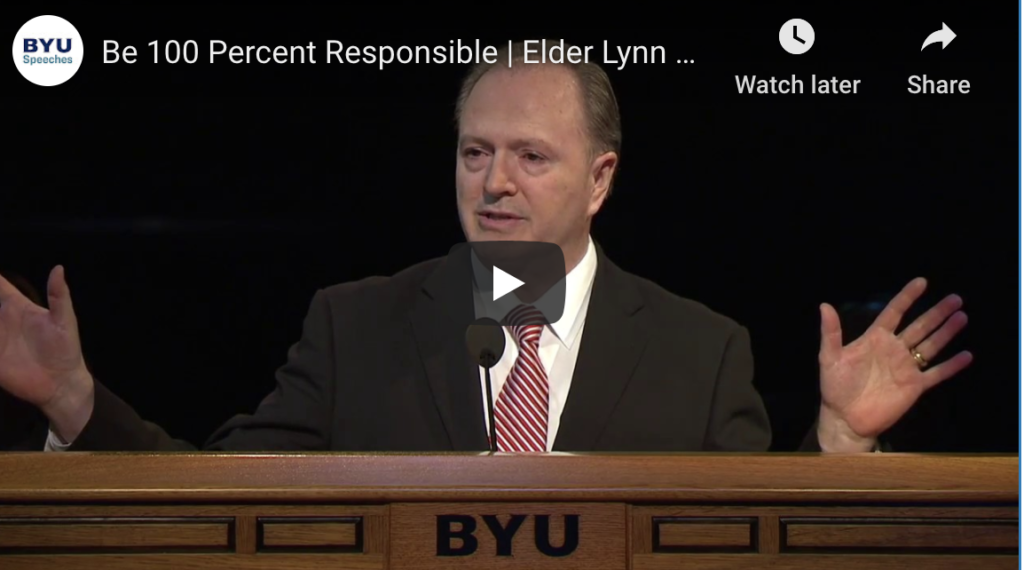
I was looking for something to watch today and this talk by elder Lynn G. Robbins was listed as the fourth most viewed BYU speech of all times. Since I had already watched the first three, I decided to watch this one today: it was a great learning experience.
I will quote below some of the main points of the talk, but here is the link to the full talk and video. It is one of the best talk I ever heard.
Agency and responsibility are inseparably connected. You cannot avoid responsibility without also diminishing agency. Mercy and justice are also inseparable. You cannot deny the Lord’s justice without also impeding His mercy.
Many gospel principles come in pairs, meaning one is incomplete without the other. I want to refer to three of these doctrinal pairs today:
Agency and responsibility
Mercy and justice
Faith and works
When Satan is successful in dividing doctrinal pairs, he begins to wreak havoc upon mankind. It is one of his most cunning strategies to keep people from growing in the light.
You already know that faith without works really isn’t faith (see James 2:17). My primary focus will be on the other two doctrinal pairs: first, to illustrate how avoiding responsibility affects agency; and second, how “denying justice,” as it is referred to in the Book of Mormon (see Alma 42:30), affects mercy.
The Korihor Principle—Separating Agency from Responsibility
One of Satan’s most crafty strategies to gain control of our agency isn’t a frontal attack on our agency but a sneaky backdoor assault on responsibility. Without responsibility, every good gift from God could be misused for evil purposes. For example, freedom of speech without responsibility can be used to create and protect pornography. The rights of a woman can be twisted to justify an unnecessary abortion. When the world separates choice from accountability, it leads to anarchy and a war of wills or survival of the fittest. We could call agency without responsibility the Korihor principle, as we read in the book of Alma “that every man conquered according to his strength; and whatsoever a man did was no crime” (Alma 30:17; emphasis added). With negative consequences removed, you now have agency unbridled, as if there were no day of reckoning.
The Nehor Principle—Denying Justice
If Satan is not successful in fully separating agency from responsibility, one of his backup schemes is to dull or minimize feelings of responsibility—what we could call the Nehor principle, also found in the book of Alma: “That all mankind should be saved at the last day, and that they need not fear nor tremble . . . ; for the Lord had created all men, and had also redeemed all men; and, in the end, all men should have eternal life” (Alma 1:4).
The Anti-Responsibility List
To illustrate, I want to share a list of things that Satan tempts people to either say or do to avoid being responsible. This list isn’t all-inclusive, but I believe it covers his most common tactics.
1. Blaming others: Saul disobediently took of the spoils of war from the Amalekites; then, when confronted by Samuel, he blamed the people (see 1 Samuel 15:21).
2. Rationalizing or justifying: Saul then rationalized or justified his disobedience, stating that the saved livestock was for “sacrifice unto the Lord” (1Samuel 15:21; see also verse 22).
3. Making excuses: Excuses come in a thousand varieties, such as this one from Laman and Lemuel: “How is it possible that the Lord will deliver Laban into our hands? Behold, he is a mighty man, and he can command fifty, yea, even he can slay fifty; then why not us?” (1 Nephi 3:31).
4. Minimalizing or trivializing sin: This is exactly what Nehor advocated (see Alma 1:3–4)….
(here is the link to the full list)
Excuses Do Not Equal Results
It is important to recognize that excuses never equal results. In the case of Laman and Lemuel, all the excuses in the world could never obtain the brass plates. The reason Nephi obtained the plates and Laman and Lemuel didn’t is because Nephi never went to the anti-responsibility list. He was a champion, and champions do not turn to the list. As Elder David B. Haight of the Quorum of the Twelve stated, “A determined man finds a way; the other man finds an excuse.”
The Difference Between Making an Excuse and Giving a Reason
It is important to note that everyone occasionally fails in their attempts at success, just as Nephi did with his brothers in their first two trips to Jerusalem when they were trying to obtain the plates. But those who are valiant accept responsibility for their mistakes and sins. They repent, get back on their feet, and continue moving forward in faith. They may give an explanation or a reason for their lack of success but not an excuse.
The Power and Reward of Being Responsible
Turning to the anti-responsibility list is an act of self-betrayal. It is to give up on oneself and sometimes on others. As I share the following stories, I hope you will observe how going to the anti-responsibility list is counterproductive, even if you are right.
Story 1: 100 Percent Responsibility in the Distribution Center
In 1983 a few partners and I started a new company that taught time-management seminars and created and sold day planners… (here is the link to the rest of the story)
Story 2: “Putting My Marriage Before My Pride”
Let me quote from the experience of a young wife:
Like any couple, my husband and I have had disagreements during our marriage. But one incident stands out in my mind. I no longer recall the reason for our disagreement, but we ended up not speaking at all, and I remember feeling that it was all my husband’s fault. I felt I had done absolutely nothing for which I needed to apologize.
As the day went by, I waited for my husband to say he was sorry. Surely he could see how wrong he was. It must be obvious how much he had hurt my feelings. I felt I had to stand up for myself; it was the principle that mattered. (Here is the link to the rest of the story)
The Greatest Example of All
Of course the Savior was the most responsible person in the history of the world. His is the greatest example. Even in His moments of excruciating pain and anguish, He showed no self-pity, one of the dysfunctional items on the list. He was always thinking outward with His ever-selfless care and concern for others—restoring a soldier’s ear in Gethsemane and, later, on the cross, praying for those who had despitefully used Him—in fulfillment of His own commandment to do so: “Father, forgive them; for they know not what they do” (Luke 23:34).
Two Ways to Deny the Lord’s Justice
Satan successfully divides the complimentary principles of mercy and justice when a person succumbs to the temptation to deny the Lord’s justice. Denying the Lord’s justice comes in at least two forms. The first, which I have already mentioned, is to deny the law of justice in regard to one’s own sins, something both Korihor and Nehor advocated. A second and equally damaging denial is not trusting in the Lord’s justice or in His wisdom in dealing with the injustices others have perpetrated against us.
In the movie based on the masterfully written classic The Count of Monte Cristo by Alexandre Dumas, Edmond Dantès, the protagonist, is an honest and loving man who turns bitter and vengeful after three covetous men bear false witness against him and frame him in a treasonous plot. When a corrupt public prosecutor becomes complicit, Dantès is arrested on the very day he is to be married to his beautiful fiancée, Mercédès. At age nineteen he is given a life sentence in the infamous island prison of Chateau d’If for a crime he did not commit… (here is the link to the rest of the story)
Conclusion
In summary, being 100 percent responsible is accepting yourself as the person in control of your life. If others are at fault and need to change before further progress is made, then you are at their mercy and they are in control over the positive outcomes or desired results in your life. Agency and responsibility are inseparably connected. You cannot avoid responsibility without also diminishing agency. Mercy and justice are also inseparable. You cannot deny the Lord’s justice without also impeding His mercy. Oh, how Satan loves to divide complementary principles and laugh at the resulting devastation!
Elder Lynn G. Robbins
(from the ChurchofJesusChrist.org)

Elder Lynn G. Robbins was sustained as a General Authority Seventy of The Church of Jesus Christ of Latter-day Saints on April 5, 1997. He is currently serving as chairman of the JustServe Steering Committee and is a member of the JustServe Advisory Committee. He is also serving as priesthood adviser of the Welfare and Self-Reliance Services Department and as an Assistant Executive Director of the Correlation Department. Elder Robbins is a member of the Area and Scriptures Committees and also serves on the advisory board for BYUtv.
Elder Robbins served as a member of the Presidency of the Seventy from April 5, 2014 to July 31, 2018. He previously supervised the North America Southeast and Southwest Areas.
He has served as President of the South America South Area, the Central America Area, and the North America West Area. He has also served in the North America Central Area.His callings during his numerous years of Church service also include full-time missionary in the Argentina North Mission and president of the Uruguay Montevideo Mission (1994–1997).
He received a bachelor of arts degree in Spanish and political science from Utah State University. In 1977 he received an MBA in world business from the American Graduate School of International Management. In his professional career, Elder Robbins was one of the founders of Franklin Quest. He finished his career there when he was called to preside over the Uruguay Montevideo Mission in 1994.
Lynn Grant Robbins was born in Springville, Utah, on October 27, 1952. He married Jan Nielson in June 1974. They are the parents of seven children.
